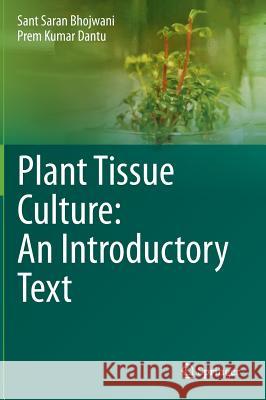Plant Tissue Culture: An Introductory Text » książka



Plant Tissue Culture: An Introductory Text
ISBN-13: 9788132210252 / Angielski / Twarda / 2013 / 309 str.
Plant Tissue Culture: An Introductory Text
ISBN-13: 9788132210252 / Angielski / Twarda / 2013 / 309 str.
(netto: 1150,16 VAT: 5%)
Najniższa cena z 30 dni: 1079,53
ok. 16-18 dni roboczych.
Darmowa dostawa!
This book covers all basic and applied aspects of plant tissue culture (PTC) for students and early-career researchers. It includes well-tested protocols and relevant media compositions that will prove helpful in conducting laboratory experiments.
From the reviews:
"Bhojwani and Dantu ... provide solid background information on and recommendations for establishing plant tissue culture labs, and discuss the theory, development, and recent advances for numerous plant tissue culture applications. ... the book describes techniques in considerable detail, and several chapters are supplemented with full protocols. This volume will be particularly useful as an overview of plant tissue culture applications for graduate-level students and professionals new to the field. Summing Up: Recommended. Upper-division undergraduates through professionals." (R. M. Warner, Choice, Vol. 51 (4), December, 2013)Preface.- 1. Historical Sketch.- 2. General Requirements and Techniques.-3. Culture Media.- 4.Tissue and Cell Culture.- 5.Cytodifferentiation.- 6. Cellular Totipotency.- 7. Somatic Embryogenesis.- 8. Androgenesis.- 9. Gynogenesis.- 10. Triploid Production.- 11. Zygotic Embryo Culture.- 12. Somaclonal Variation.- 13. In vitro Fertilization.- 14. Parasexual Hybridization.- 15. Genetic Engineering.- 16. Production of Virus-free Plants.- 17. Micropropagation.- 18. Production of Industrial Phytochemicals.- 19. Conservation of Biodiversity.- Subject Index.
Dr S.S. Bhojwani has over 40 years of experience of research and teaching Plant Biotechnology to undergraduate and postgraduate students. After 33 years of service at the Department of Botany, University of Delhi, in 2002 Professor Bhojwani moved to Agra as the Director of the Dayalbagh Educational Institute (Deemed University). He continues as Emeritus Professor of Botany with the DEI. Prof. Bhojwani has published over 90 original research papers in reputed international journals and guided 17 doctoral and 11 M.Phil. thesis and authored/edited 7 books on Plant Tissue Culture and the Embryology of Angiosperms, some of which have been translated into Japanese and Korean languages. Prof. Bhojwani has been a Member of Organizing Committee, Session Chairman, Organizer of Workshop, and Invited Speaker for several National and International Conferences held in India and overseas. He has been the recipient of many international Fellowships for advanced research in Canada, Japan, New Zealand, Germany, South Korea, and U.K. He has been on the editorial boards of the journals Scientia Horticulurae, Plant Biotechnology Reports and Plant Tissue Culture.
Dr. P.K. Dantu has 20 years of research and teaching experience in the field of Plant Biotechnology. After completing Ph.D. in 1992, he joined IARI and worked on genetic modification of Lathyrus sativus to produce OX-DAPRO-free lines. He was instrumental in setting up a commercial plant tissue culture laboratory with a production capacity of half-a-million horticultural species. In 1997, Dr Dantu returned to academics and after a brief stint at University of Delhi, in 2004 he joined the Department of Botany, DEI as Associate Professor and was promoted to Professor in 2012. Prof. Dantu is currently working on various biotechnological aspects of medicinal plants. He has guided 5 doctoral and 4 M.Phil. theses and 10 M.Sc. dissertations. He has published 20 research papers and contributed 6 book chapters. He participated in several national and international conferences and was invited as Resource person to the International conference on “Biodiversity Conservation and Education for Sustainable Development: Learning to Conserve Biodiversity in a Rapidly Developing World” held during CBD COP-11 in Hyderabad.
Plant tissue culture (PTC) is basic to all plant biotechnologies and is an exciting area of basic and applied sciences with considerable scope for further research. PTC is also the best approach to demonstrate the totipotency of plant cells, and to exploit it for numerous practical applications. It offers technologies for crop improvement (Haploid and Triploid production, In Vitro Fertilization, Hybrid Embryo Rescue, Variant Selection), clonal propagation (Micropropagation), virus elimination (Shoot Tip Culture), germplasm conservation, production of industrial phytochemicals, and regeneration of plants from genetically manipulated cells by recombinant DNA technology (Genetic Engineering) or cell fusion (Somatic Hybridization and Cybridization). Considerable work is being done to understand the physiology and genetics of in vitro embryogenesis and organogenesis using model systems, especially Arabidopsis and carrot, which is likely to enhance the efficiency of in vitro regeneration protocols. All these aspects are covered extensively in the present book.
Since the first book on Plant Tissue Culture by Prof. P.R. White in 1943, several volumes describing different aspects of PTC have been published. Most of these are compilation of invited articles by different experts or proceedings of conferences. More recently, a number of books describing the Methods and Protocols for one or more techniques of PTC have been published which should serve as useful laboratory manuals. The impetus for writing this book was to make available a complete and up-to-date text covering all basic and applied aspects of PTC for the students and early-career researchers of plant sciences and plant / agricultural biotechnology.
The book comprises of nineteen chapters profusely illustrated with self-explanatory illustrations. Most of the chapters include well-tested protocols and relevant media compositions that should be helpful in conducting laboratory experiments. For those interested in further details, Suggested Further Reading is given at the end of each chapter, and a Subject and Plant Index is provided at the end of the book.
1997-2026 DolnySlask.com Agencja Internetowa
KrainaKsiazek.PL - Księgarnia Internetowa









